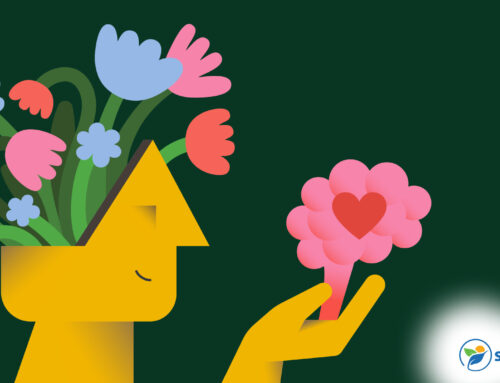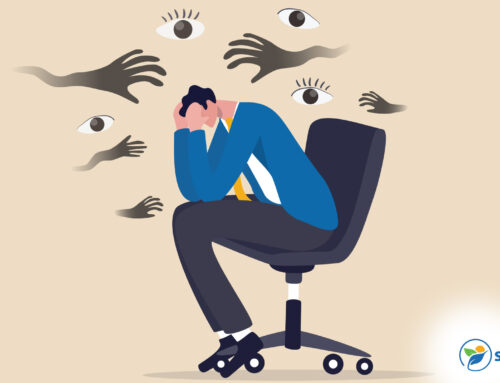Language is an essential means of communication, yet negative words associated with mental health can be profoundly wounding. When derogatory words are used in connection with mental health, everyone suffers—especially the individual experiencing mental health issues.
According to the 2022 National Survey on Drug Use and Health (NSDUH), more than 59 million adults in America (or 23.1 percent) had a past-year mental illness. Six percent of adults (15.4 million people) had a severe mental illness during the past year.
The Language of Mental Health: Slang and Euphemisms
Mental health experts agree that the use of negative words associated with mental health is a daunting barrier to seeking help. When someone uses slang terms or euphemisms in talking about or to a person with a mental health disorder or condition, it demeans the affected individual. Repeated use of derogatory words allows stigma and discrimination to become acceptable, even commonplace.
How much stigmatizing language has infiltrated every aspect of society is astonishing. Slang terms are rife in movies and TV shows. Whether it’s a drama, comedy, romantic comedy, goofball, thriller, horror, action, or Western, characters utter insensitive words and use derogatory terms about mental illness. This is essentially the fault of the writers, who could easily use another word for mental illness. Yet, it’s so ubiquitous in today’s culture to use shortcut slang, especially if it’s believed to be funny, that rooting out this practice is a formidable challenge.
Exploring Terminology and Its Impact on Stigma
How does the use of derogatory words contribute to the lingering stigma around mental health disorders and those experiencing mental illness? Using negative words associated with mental health and derogatory terms for individuals experiencing mental health disorders helps perpetuate fear, distrust, suspicion, and dislike.
It may seem like using another word for mental illness that’s popular in culture is fine when it’s anything but appropriate. It could be vulgar, coarse, insulting, or misleading. Words have tremendous power. When they’re used deliberately or inconsiderately, they can hurt. The damage caused by the use of slang and other negative words associated with mental health is long-lasting.
The problem is more than word choice because many well-meaning people who wouldn’t dream of demeaning others may repeat and often use slang words and terms ingrained into today’s societal lexicon. They don’t realize that their words serve to reinforce negative stereotypes about mental health.
How Words Stigmatize and Wound
The recipient of the stigmatizing language may begin to believe that they’re stuck suffering from a mental health disorder. Worse, they may see themselves as defined by it and somehow lesser societal contributors.
Stigmatizing words are triggers. They trivialize mental health disorders and those experiencing them. They further stereotypes that are inaccurate, insulting, and belittling.
Research into stigma reveals that the term encompasses three related problems. These include ignorance, or lack of knowledge about mental health, prejudice, negative attitudes about mental illness and mental health, and discrimination or behaviors that are excluding or avoiding.
Emotionally charged words or negative terms are usually directed at or used by young people to refer to those with mental illnesses as individuals with physical disabilities.
Many Individuals with Mental Illness Don’t Get Treatment
One of the tragic consequences of stigma around mental health is that about 40 percent of those experiencing a mental health disorder never seek or receive treatment. Stigma is one of the primary reasons.
Instead of believing they can get help to overcome a mental health disorder, like depression, bipolar disorder, anxiety, obsessive-compulsive disorder, eating disorder, schizophrenia, or another mental health disorder, they shy away from treatment. They’re ashamed, worried others will judge them, that they’ll lose their job or family. Many don’t think they have a condition that’s severe enough to warrant treatment, so they try to navigate their symptoms alone. Scared that they’ll be targeted, they may deny that anything is wrong, telling themselves they’re fine without help.
Because of the stigma surrounding mental health disorders, many individuals who may be experiencing difficulties won’t talk about what they’re going through—even with family and friends.
Common Slang and Euphemisms for Mental Health Issues
Ask anyone to name slang, euphemisms, derogatory words, and derogatory terms for mental health issues, and the results will generally include one or more of the following. The language we use is constantly shifting, some terms taking on more negative connotations echoing a time where conditions were less understood. The terms listed below are either outdated and no longer recommended or shifting toward being used less often.
- Abnormal
- Anorexic
- Battling with, suffering from mental illness
- Berserk
- Bonkers
- Braindead, brainless
- Coo-coo
- Committed suicide
- Crazy
- Demented
- Deranged
- Dim, dimwit
- Disturbed
- Dumb, dummkopf
- Escaped from an asylum
- Freak
- Fruit cake
- Goon
- Gone in the head
- Handicapped in the head
- Happy pills
- Head case
- Imbecile, imbecilic
- Insane
- Intellectually challenged
- Irrational
- Loon, loony, loony bin, looney tunes
- Lunatic
- Mad
- Mental, mental case
- Moron, moronic
- Not all there, not quite there
- No one home
- Not the sharpest knife in the drawer
- Numscull
- Nutcase, nuts, nut job, nutso, nutter
- Nuthouse
- Oddball, odd
- Off-their rocker
- Off their nut
- Off in space
- Out of it
- Out of their mind
- Psycho
- Retard, retarded
- Sawdust for brains
- Scary
- Schizo
- Screwball, screw loose
- Sick in the head, sicko
- Simpleton
- So OCD
- Spacy, space cadet
- Spakka, spastic, spaz
- They’re so bipolar
- They’ve got a screw loose
- Unhinged
- Unstable
- Veg
- Wally weirdo, weird, weirdo
- Way out there
- World of their own
Promoting Open Dialogue and Accurate Communication About Mental Health
When people hear negative words associated with mental health, it reinforces stereotypes and diminishes self-worth. those affected by derogatory words feel less than rather than equal to. Not only is this detrimental to their mental health, it’s also self-perpetuating.
Here are 10 ways to promote open dialogue and clear, accurate communication about mental health:
- Cultivating awareness is the first step to eliminating stigma about mental health and purging the use of slang euphemisms and negative words associated with mental health.
- Creating and practicing acceptable communication techniques and skills about mental health is another crucial aspect in promoting open dialogue and speaking and communicating accurately.
- Leave judgment out of all conversations and communications. No one experiencing a mental health condition deserves to be judged, not for what they’re going through, how they speak or act, or their physical or psychological state.
- Avoid making fun of those experiencing mental illnesses, mental health disorders, or conditions. This isn’t a laughing matter. Remember that words hurt, and inaccurate, stigmatizing labels have no place in a compassionate, informed society.
- Use appropriate terms and expressions. Since language is so emotionally charged, be thoughtful when speaking about issues surrounding suicide. Instead of saying someone “committed suicide,” it would be better to say they took or ended their life or died by suicide. Avoid saying someone was unsuccessful at suicide. This implies wanting them to be successful in the attempt. This is one example of how important word choice is when describing or talking about mental health disorders or conditions.
- Help to stop unhealthy imaging. From Halloween costumes to decor, gift items, greeting cards, calendars, and other items, work to stop using unhealthy images depicting mental health inaccurately.
- Promote and applaud shared personal experiences with mental health problems. Celebrities have a platform that can be used to further awareness of mental health conditions and problems. When someone experiencing bipolar disorder, major depressive disorder, or obsessive-compulsive disorder speaks up about it, we gain insight into what they’re going through. This serves to demystify mental health disorders. It also helps to promote understanding about mental health and the importance of treatment.
- Focus on person-centered framing. Shift mindset from talking about mental health disorders and illnesses as a stigmatized condition to one that encourages person-centered framing. This means avoiding the use of negative words associated with mental health. By so doing, this helps reinforce the fact that individuals deserve care and compassion. Furthermore, mental health disorders can be managed and treated, thus allowing affected individuals to go on to recovery.
- Be mindful of words and terms and their meaning. To change how society talks about mental health, everyone needs to think about the words and terms they use. Words have meaning. When misused, they can cause harm to others. Even when negative words associated with mental health are used unintentionally, the damage can be costly.
- Show respect and treat people with dignity. When interacting with someone experiencing mental health problems, be sure to afford them the respect and dignity they deserve. This is as simple as the golden rule to treat others as you wish to be treated. Yet, those with mental health challenges or issues can benefit even more from your compassion and caring words and actions.






